5 Science-Backed Secrets for Better Sleep
AUSTIN PERLMUTTER, MD

A message from Dr. Austin Perlmutter
9 Incredible Sleep Statistics
Sleep Tip #1: Great sleep starts with your morning routine
> Optimize your light exposure
> Minimize caffeine exposure in the afternoon
> Be careful with evening/nighttime alcohol intake
Sleep Tip #2: Make your room a sleep sanctuary
> Remove unnecessary devices
> Remove unnecessary noises
> Optimize your bedroom temperature
Sleep Tip #3: Get your brain and body ready for sleep
> Listen to music
> Take a hot bath/shower before bed
> Practice mindfulness
> Practice gratitude
> Read a (paper) book
Sleep Tip #4: Move your body every day
Sleep Tip #5: Practice consistency in sleep and waking times
Additional Considerations
> What about naps?
> What about sleep supplements and medications?
> Prescription sleep aids
> Over-the-counter sleep aids and supplements
2 5 SCIENCE-BACKED SECRETS FOR BETTER SLEEP
Table of Contents
When to speak with a healthcare provider about your sleep Summary: 5 Secrets for Better Sleep Science and Studies 3 4 5 9 13 17 18 20 22 23 24
A message from Dr. Austin Perlmutter
Getting good sleep is one of the most important things we can do for the health of our bodies and brains. Yet most people treat quality sleep as an afterthought—something to only pay attention to after everything else is said and done. Additionally, many of us have a lot of trouble getting good, consistent sleep. All of this helps to explain why, when it comes to getting adequate, quality sleep each night, so many of us come up short.
What can we do to get better sleep? Here’s the good news: a lot! In fact, this guide is packed with practical tips you can start using today! In addition, you’ll learn about sleep aids, naps, when to seek out extra help and lots more. I’ve personally found many of these strategies to be game changers for my quality of sleep, and if you’d like to learn more simple tools to improve the health of your brain and body, I invite you to join me on my website, Austinperlmutter.com I hope you enjoy this guide!
Austin Perlmutter MD


5 SCIENCE-BACKED SECRETS FOR BETTER SLEEP
9 Incredible Sleep Statistics
About 1/3 of American adults report getting less than 7 hours of sleep a night (on average), and sleep deprivation is a global issue.
Among US states, Hawaii, West Virginia, Kentucky and Tennessee report the highest rates of insufficient sleep.
An estimated 50-70 million Americans have chronic sleep disorders.
American adults feel sleepy 3 days a week, which is linked to poor mood and overall feeling unwell.
Lack of good sleep is linked to worse mental health, trouble thinking, risk for heart disease and dementia.
Sleep loss may increase our intake of unhealthy foods and promote weight gain.
Almost a billion people around the world are likely to have obstructive sleep apnea (OSA), a condition that damages sleep quality and health.
China has the highest rates of sleep tablet use, with 1 in 5 people using prescription sleep drugs.
Getting better sleep is linked to better memory, improved focus, calmer emotions and more creativity.
4 5 SCIENCE-BACKED SECRETS FOR BETTER SLEEP
Great sleep starts with your morning routine
If you really want to prioritize good sleep, you have to start thinking about it long before you hit the hay. Here are 3 simple steps to take each day to help promote good sleep later that night:
Optimize your light exposure
Research is revealing that how and when we interact with light can significantly alter our biology. Whether it’s an increased risk for mood issues in people who get less daylight in the winter or eye strain from looking at a digital screen, light exposure affects our bodies and brains in a number of ways. As it relates to sleep, there are two specific ways in which light exposure is worth extra focus.
1- Get more natural light in the morning
While you never want to look directly into the sun, getting natural light in your eyes may help your brain to know that the day is starting, setting the circadian rhythm (the body’s 24-hour internal rhythm) and prepping the brain so it knows to get ready for sleep at the end of the day. In addition, for some people, morning light may be helpful for a mood boost. Ideally shoot for direct sunlight in your eyes within an hour of waking (without sunglasses on or through glass) may be best. Even overcast days provide a
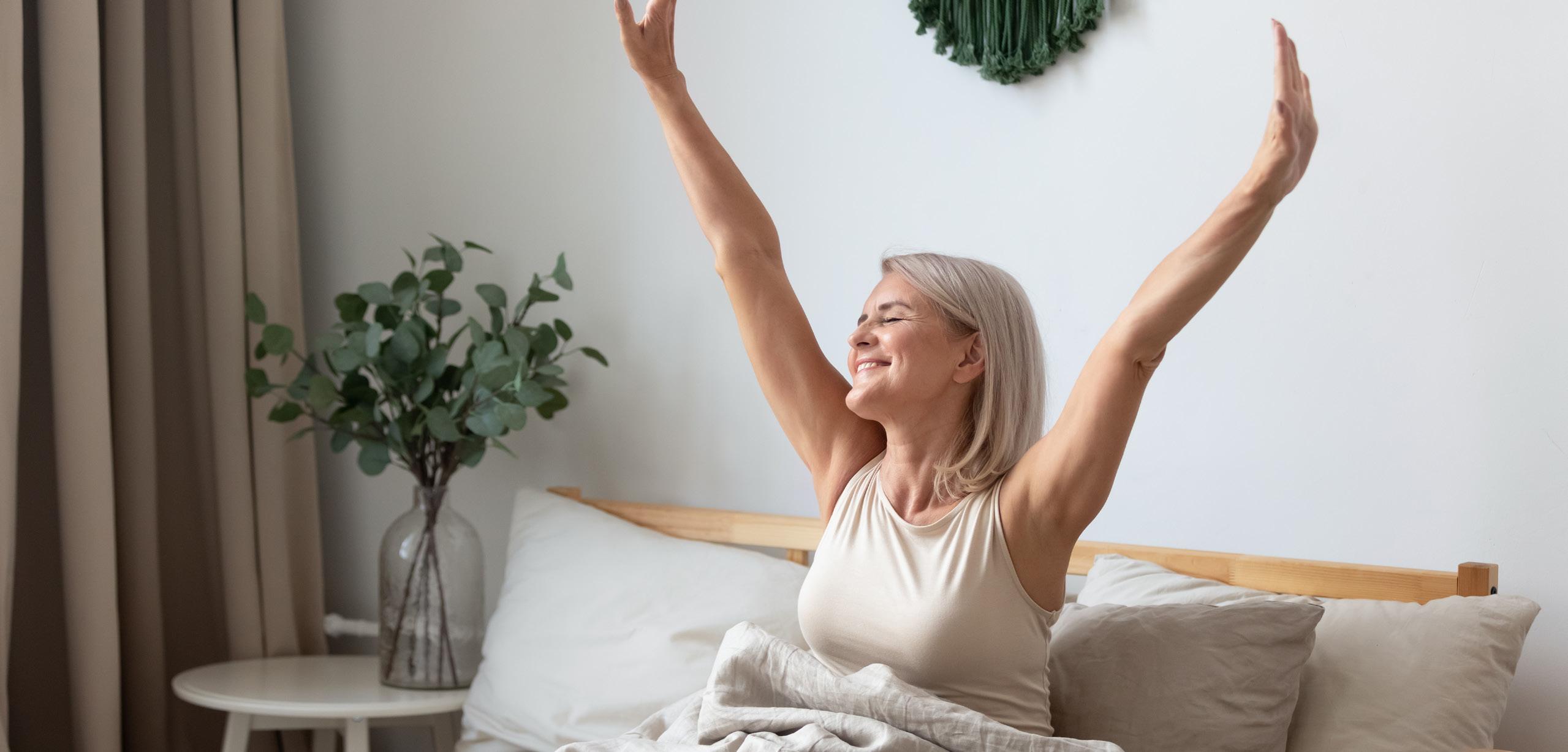
SLEEP TIP #1
decent dose of natural light! Note that most artificial lights don’t convey the same benefits unless they’re specialized artificial lightboxes designed to mimic sunlight.
2- Get less artificial light at night (especially blue light!)
At the other end of the day, artificial light at night has been linked to worse quality of sleep. That’s thought to be in part due to the suppressive effects of light on production of the hormone melatonin. Recent research suggests that exposure to blue light wavelengths (common in light coming from our digital devices) may be especially problematic for our sleep. For this reason, many experts recommend limiting exposure to digital devices in the hours before bed.
TRY THIS
• Get 15-30 minutes of early morning sun in your eyes (remember, don’t look directly at the sun!)
• Consider taking a morning walk outside to capture some of the sun’s rays
• Try drinking your morning coffee or tea outside
• Limit overall exposure to digital devices in 1-2 hours before bed
• Activate “night shift” or equivalents on your digital devices to lower exposure to activating wavelengths of light in the evening
Minimize caffeine exposure in the afternoon
All too often, we forget that caffeine has a long half-life (6 hours!). That means half of the caffeine in that cup of coffee you drank at 4 pm is still around at 10 pm. In a 2022 study of adolescents, consuming more caffeine was linked to more trouble falling asleep and reduced sleep time, but mainly for those who consumed caffeine in the afternoon and the evening.
TRY THIS
• Consider stopping caffeine at least 8 hours before bed
• For most people, limiting caffeine consumption after 12PM is may be a good first step, but it may need to be even earlier for some, and a bit later for others
• If you feel compelled to have an afternoon pick-me-up drink, try subbing some mint or other herbal tea for your usual afternoon energy drink or coffee
6 5 SCIENCE-BACKED SECRETS FOR BETTER SLEEP
• Instead of turning to stimulants, try energizing your body with some brisk movement or breathing exercises
Be careful with evening/nighttime alcohol intake
Though the mechanism is different from caffeine, drinking alcohol late in the day/ before bed may also have a significant negative effect on sleep quality. The “nightcap” may seem appealing in the movies, but the reality is that alcohol consumption, especially in the hours right before bed is likely to damage the quality of your sleep. For example, one study in college students found that people who drank more before bed stayed asleep for less time, woke up more in the night, and felt sleepier on waking. Beyond this, alcohol consumption is also correlated with an increased risk for obstructive sleep apnea (OSA), which a top contributor to poor sleep and other health issues.
TRY THIS
• Consider limiting your alcohol consumption later in the afternoon and evening for higher-quality sleep
• If you’re feeling pressured to drink at an evening social event, club soda with bitters is an excellent (and delicious) alcohol alternative
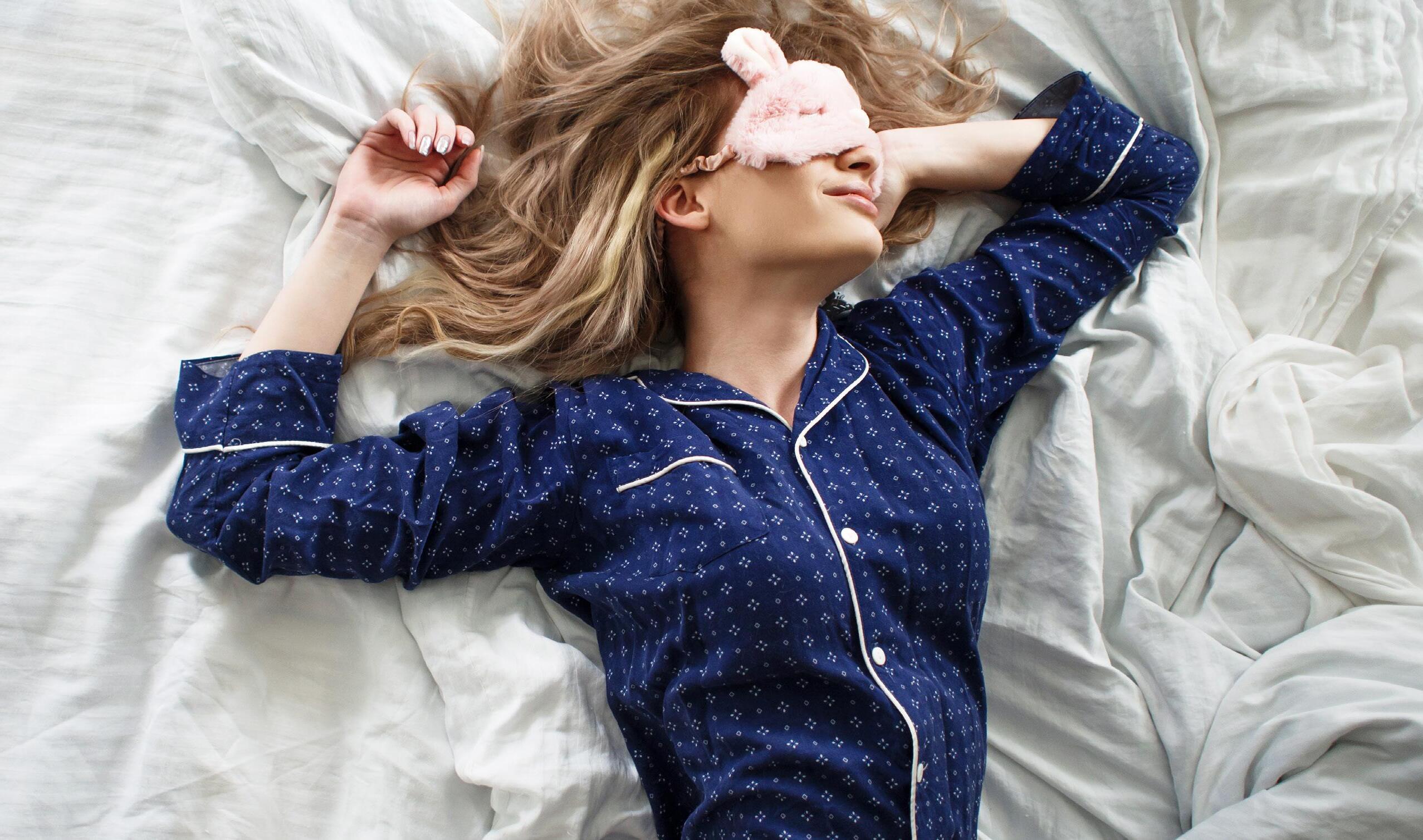

8 5 SCIENCE-BACKED SECRETS FOR BETTER SLEEP
Make your room a sleep sanctuary
With our modern lifestyles keeping us busy and engaged for so many of our waking hours, it’s easy to let work and entertainment into the bedroom. A number of recent surveys have concluded that most of us reach for our phones in the first few minutes after waking. But beyond the tech, we often ignore the role of variables like temperature, light and sound on our sleep quality. Here’s how to counter each of these and create a more restful bedroom that will promote healthier sleep!
Remove unnecessary devices
We live in an era where almost everyone is interacting with technology all day long, it’s important that we draw a boundary with our tech so that it doesn’t impair our sleep quality. There are a number of reasons why having unnecessary technology (think TVs, smartphones and tablets) in the bedroom can be a problem for good sleep, but here are 4 of the most important:
1. Tablets, phones and TVs emit blue light which can suppress our body’s natural wind-down/sleep cycles and disrupt melatonin release.
2. Having devices in our rooms makes us more likely to stay up late on our screens, distracting us from getting to bed on time and cutting into our nightly rest.
3. Smartphones can unexpectedly buzz, light up or otherwise try to notify us, waking us unnecessarily from sleep.
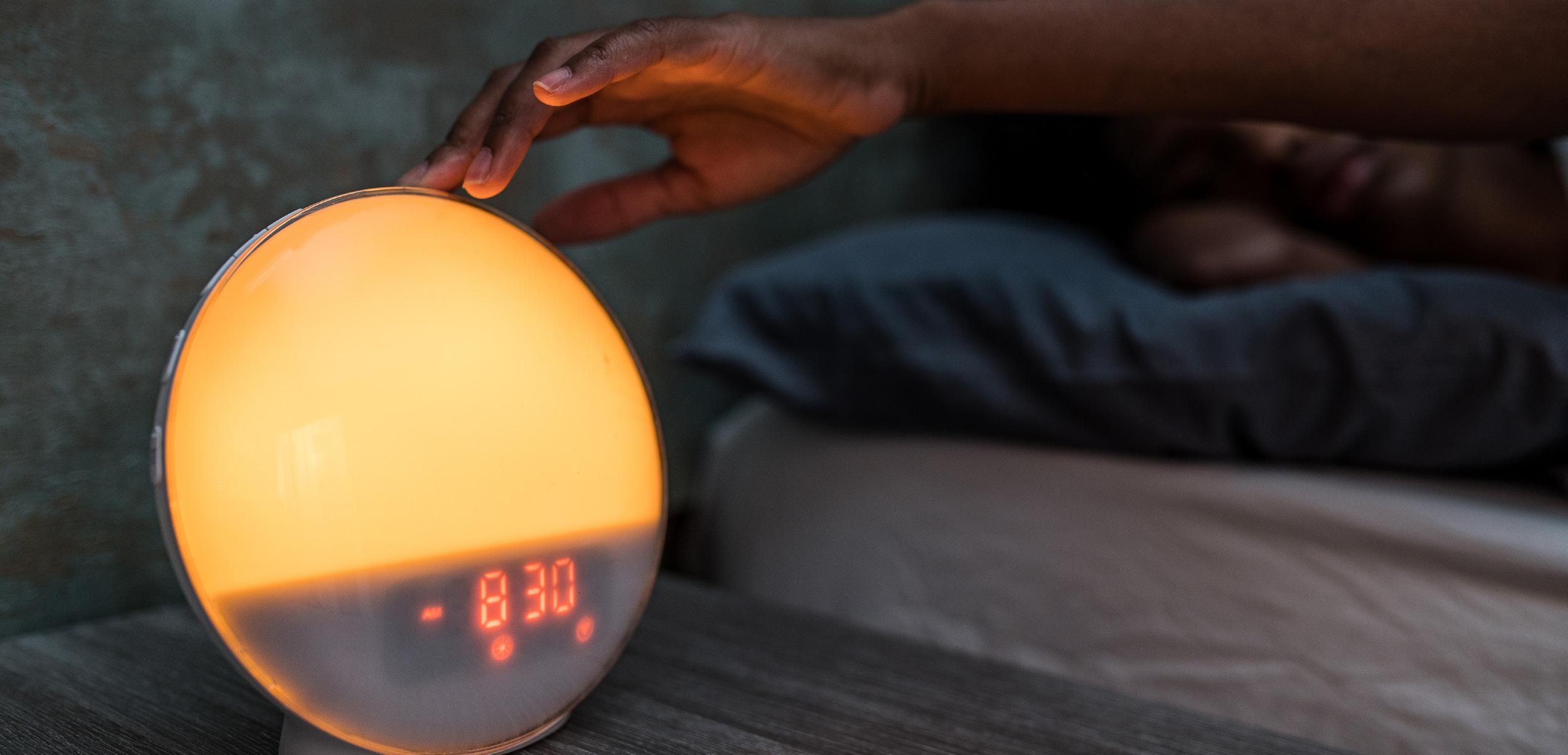
SLEEP TIP #2
4. Our digital devices are very activating for our brains, especially if we’re consuming stressful media. That revs up our brains and makes it harder for them to get into the calmed state that is best for falling and staying asleep.
TRY THIS
• Walk around your room and remove all unnecessary devices, especially those with screens (yes, you might even consider moving the TV!)
• Do your best to keep electronic devices outside the bedroom. That means charging your phone outside your bedroom.
• Purchase a low-tech alarm clock instead of using the one on your phone.
Remove unnecessary noises
Making changes to lower exposure to nighttime noises can be challenging, especially if you live somewhere loud, have roommates, children or a partner that is a loud sleeper. But the science here doesn’t lie: noisy bedrooms are simply bad for our sleep quality.
Reasons why we might have loud bedrooms vary depending on where we live and our unique circumstances. For example, people who live in large cities will have a much higher exposure to transportation-related noise (like road traffic from vehicle engines). It’s thought that louder noises (over 45 db, which for reference, is about how loud a refrigerator or softer conversation is) impact sleep by making it harder to fall asleep and waking us up during the night. Interestingly, research shows that we may be more sensitive to sounds later in the night, when we’re overall less sleepy.
So, what can we do to reduce the negative effects of loud noises on our sleep? While we may not be able to remove all the noise, there are certainly some important actionable strategies:
TRY THIS
• Seal the cracks: sounds can easily navigate around and under doors if there are gaps present. If you can see gaps around and under your door, consider purchasing materials to help close the holes and keep out the unnecessary noise!
• Add noise absorbers: remember how much louder it was when you first moved into your empty house, apartment or even your dorm room? Sounds like to bounce off hard surfaces and reflect throughout a room. How do you stop this from happening?
10 5 SCIENCE-BACKED SECRETS FOR BETTER SLEEP
• Consider getting a plush carpet, adding a piece of furniture, hanging some art or putting some plants in your bedroom. This will help dampen the noise and provide an aesthetic bump!
• Invest in a white noise machine: Fight fire with fire! It turns out that you can indeed fight back against noise pollution using the power of white noise. Use of a white noise machine has been shown to offset a loud urban environment as measured by better reported and measured sleep quality. It’s important to note that there’s a huge range of “white noise machines,” and some play nature noises while others play a low mechanical hum and others sound like a fan. To some degree, finding the right white noise machine is a personal preference (do you like water noises, want a range of options or prefer a single, more generic sound?)
Optimize your bedroom temperature
You might not think about it outside of feeling occasionally uncomfortable or getting a fever, but our internal temperatures change throughout the day. In fact, they actually vary by around 2 degrees Fahrenheit overnight. This seemingly subtle change is perhaps most notable for the drop in temperature that happens before bed which is linked to release of the sleep hormone melatonin.
When it comes to the connection between temperatures and sleep quality, slightly lower temperatures seem to be the key. In a recent study, researchers compared bedroom temperatures with quality of sleep, and found that cooler temperatures were linked to better sleep.
What are the ideal temperatures that promote sleep? This may vary person to person, but the scientific consensus speaks to a goal bedroom temperature of around 60 to 67 degrees Fahrenheit (15.6 to 19.4 degrees Celsius).
TRY THIS
• If you live somewhere less noisy and cool, consider opening windows at night
• If you have an air conditioner, consider setting it to between 64-67 degrees Fahrenheit
• Consider using a fan to help keep your bedroom cool overnight
• Try a shower or bath before bed (more on this in Tip #3!)
11 5 SCIENCE-BACKED SECRETS FOR BETTER SLEEP
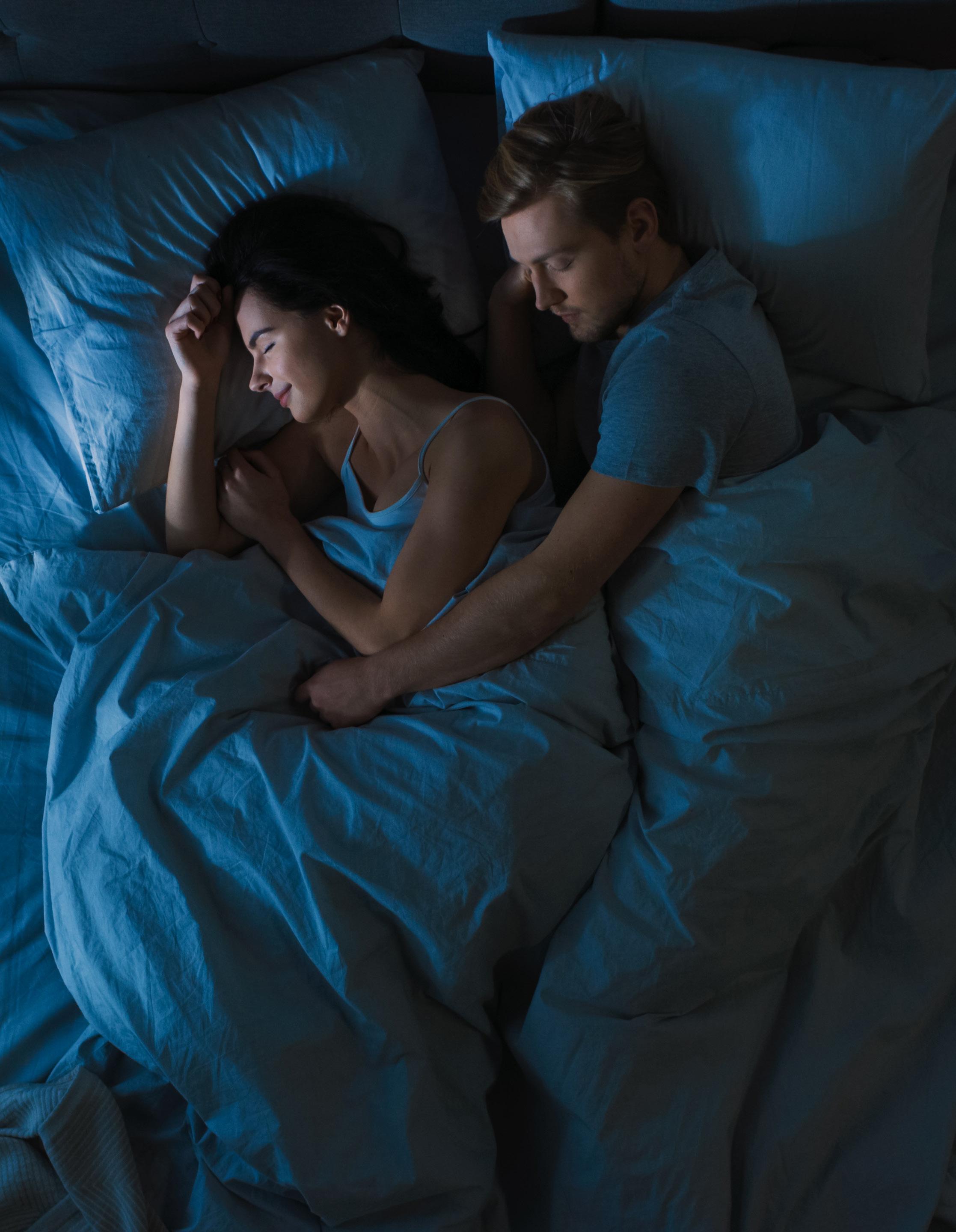
12 5 SCIENCE-BACKED SECRETS FOR BETTER SLEEP
Get your brain and body ready for sleep
One of the clearest connections between psychological state and sleep relates to stress. Specifically, it’s hard to fall and stay asleep if our minds are anxious and spinning. While people with significant and ongoing stress may benefit from seeking professional help, there are a number of straightforward practices that can help our brains to wind down from the day’s stressors.
Listen to music
In addition to just being enjoyable, research suggests that listening to certain types of music may have beneficial effects on our bodies that could translate into better sleep. For example, one study showed that people who listened to classical music had decreases in their levels of the stress hormone cortisol. Listening to music during the day has also been linked to improvements in reported sleep quality. The perfect way to use music for better sleep hasn’t really been established, but to begin, you might consider listening to relaxing music in the hour before bed.
TRY THIS
• Put on headphones and listen to classical music in the hour before bed.
• Combo calming music with another calming bedtime routine like a breathing exercise, bath/shower or light stretching.
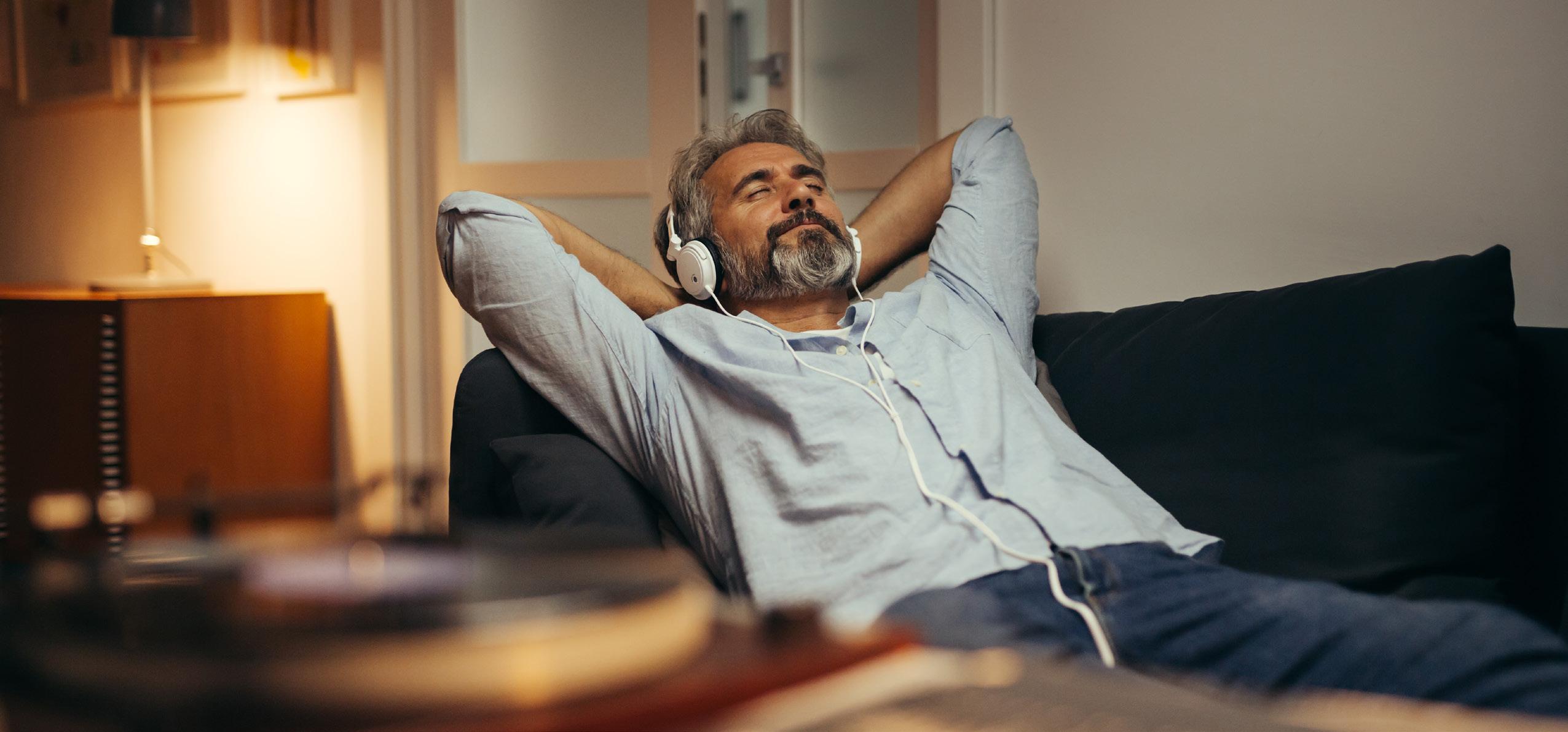
SLEEP TIP #3
Take a hot bath/shower before bed
Indulging in a hot bath or shower before bed just sounds like an effective way to destress and prepare for a restful night of sleep. But now research is indicating that there’s much more to the science than might have been guessed.
When we take a hot bath or shower, we feel initially warmed by the water. But after we get out, our blood vessels stay dilated, which transfers heat to our hands and feet. That heat is more easily lost to our environment, and the net effect is actually lowering our core body temperature (which again, promotes better sleep).
To be more specific about this science, a recent analysis examined a number of scientific studies on the subject. It found that water temperatures of 40–42.5 °C (around 104-108 °F) between 1-2 hours before bed for a minimum of 10 minutes was linked to shorter time falling asleep and better reported sleep quality.
TRY THIS
• Take a hot shower or warm bath in the hours before bed (or if you’re lucky enough to have access to a hot tub, that works too!)
Practice mindfulness
We all know that life is extremely stressful these days. But in addition to the stress, many of our activities are also more mindless, meaning that we spend a lot of our time doing things like watching TV, scrolling on our phones or even performing jobs that don’t require a ton of engagement and can be done almost on autopilot. Though we’re still learning the impact of this mindless activity on our sleep, research has revealed an effect of getting more of the exact opposite: more mindful time.
Mindfulness is simply the idea of paying more attention to the present moment. There are a wide range of methods used to practice mindfulness ranging from more formal meditation to simply paying attention to your breathing to mindful eating. Research so far supports a potential role of mindfulness practices in promoting healthy sleep, though there’s still important scientific work to be done. The great thing about mindfulness is that it’s very easy to put into practice!
TRY THIS
• Before bed, find a quiet place and close your eyes and count your breaths for 5-10 minutes.
14 5 SCIENCE-BACKED SECRETS FOR BETTER SLEEP
• After dinner, go for a short (5-10 minute) walk without your phone, and simply take in the surroundings.
• Try a meditation app like Headspace or Calm in the hours before bed (but remember, don’t leave your phone in your room overnight!)
Practice gratitude
Consciously drawing attention to what we already have in life is called practicing gratitude, and it’s now the subject of a number of scientific studies. Gratitude practice is a form of positive psychology. In a number of studies, this practice correlates with better health outcomes including better quality of sleep. In essence, the idea is to first affirm the wonderful things in the world and in our lives, and then appreciate that many of these things come from others and from the larger world.
TRY THIS
• Keep a designated gratitude journal (can just be a standard plain-page notebook!) next to your bed. Before you go to sleep, write down 3 things you are thankful for.
• Establish a daily practice of simply thinking about and appreciating the important people in your life (again, consider doing this right before bed).
Read a (paper) book
Many of us may choose to open a book and read a few pages (or chapters) before bed. Though it’s not been heavily studied, this practice has been linked to improved sleep quality. But before you jump into your favorite page-turner, here are two key considerations:
• These days many of us turn to a tablet or e-reader for our reading. Though convenient, these devices may have a negative effect on our ability to get good sleep. Several recent studies link nighttime exposure to e-readers and tablets to worse sleep quality. When compared to reading from a conventional paper book, people reading from a tablet felt less sleepy. This may be in part due to the blue light that comes through the device screens.
• When choosing a good book to read before bed, remember that the goal is to help your brain wind down, not rev up! To this end, highly activating/stressful or even highly engaging books may not be ideal.
15 5 SCIENCE-BACKED SECRETS FOR BETTER SLEEP
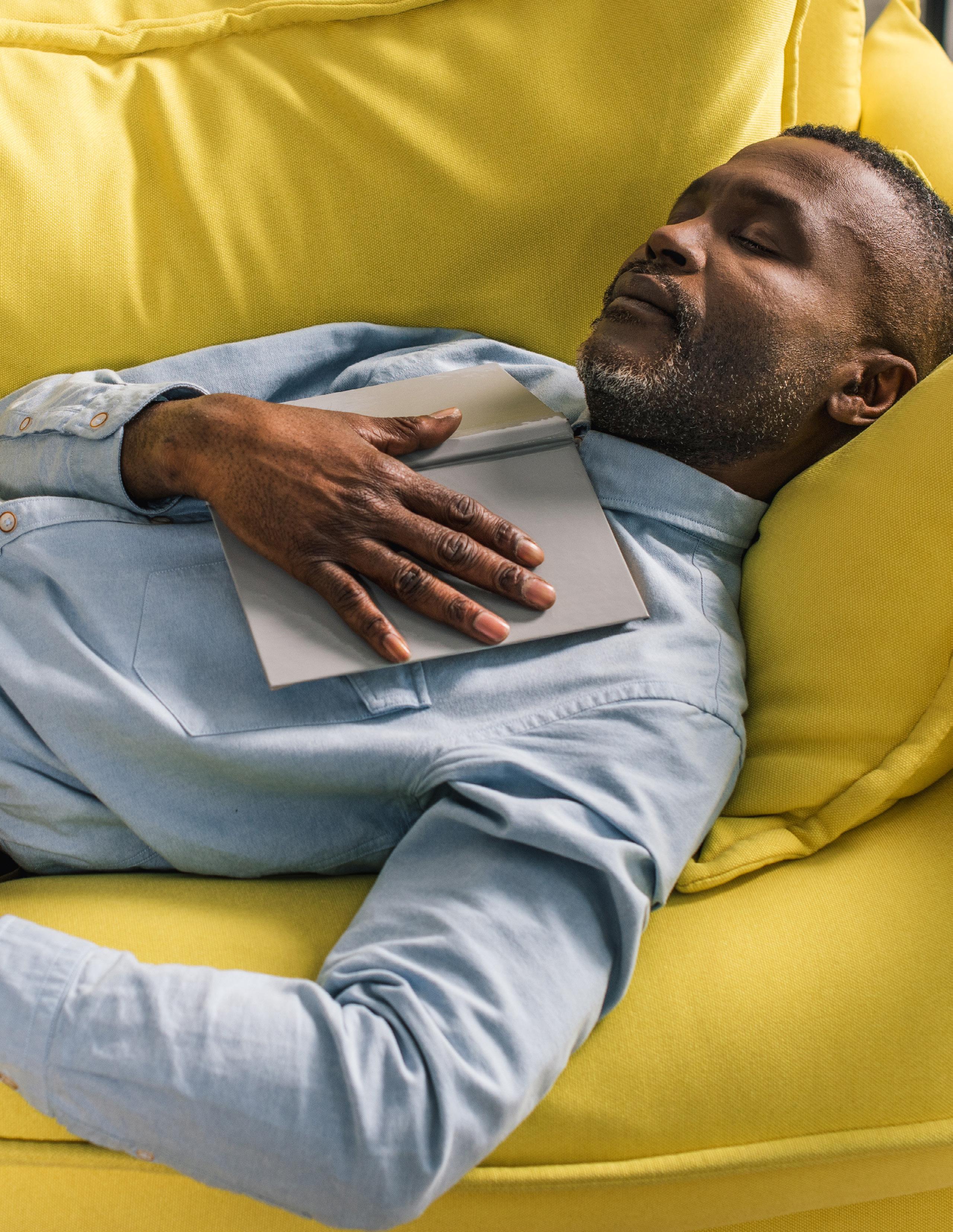
Move your body every day
Physical activity has long since been established as one of the best ways to care for our bodies. Yet recent scientific study has shown that moving our bodies is also a great way to care for our brains. One way that seems to happen is by improving the quality of our sleep. In a recent analysis of the existing science, researchers found that exercise was linked to significant improvements in sleep quality. This may be especially relevant for people with insomnia.
So how often do we need to exercise to reap benefits to our sleep? In one study looking at older adults, moderate intensity exercise three times a week for at least 12 weeks was best. Yet other data suggests a benefit to sleep that comes from doing regular yoga, tai chi or simply regular walking. As far as duration of exercise, if you’re not already engaging in an exercise routine, consider starting with something you can manage to do a few days a week (like a walk around the neighborhood) and building up to longer periods of activity.
TRY THIS
• Shoot for 20 minutes of movement of any kind for at least 5 days a week.
• If you’re not someone who regularly exercises, experiment with different movements (yoga, Pilates, resistance training, walking, swimming etc.) to see what you actually enjoy.
• Build 5-minute intervals in your workday dedicated to some type of movement. Even if it simply means getting up from your chair to walk around the house or office—little things add up!

SLEEP TIP #4
Practice consistency in sleep and waking times
Our sleep routines are often influenced by our shifting desires, obligations and schedules. This can translate into vastly different bedtimes depending on the day of the week and everything else happening in our lives. But we’re increasingly recognizing that when it comes to sleep, consistency is key.
Many of us already know that a regular sleep routine is vitally important for children, as it’s linked to better memory, focus and more. Now research confirms that a regular sleep schedule is something that adults need to prioritize as well. In an eye-opening article published in 2018, researchers looked at the relationship between irregular sleep (for example, making frequent changes to your sleep schedule) and a number of other health outcomes. They found that older people reporting more irregular sleep were at increased risk for daytime sleepiness as well as risk for blood sugar problems and worse mental health.
These types of findings mean that getting good sleep isn’t just about the number of hours of sleep, but when and how we get those hours. Clearly, we’re not always going to be able to get in bed at the same hour every night, but there are often a number of things we can do improve the consistency of our sleep.
TRY THIS
• Set (and stick) to a consistent bedtime and waking time for at least 5 days of the week.
• Work backwards from your goal wake up time and bedtime so you don’t find yourself cutting into your sleep period with avoidable tasks or activities.
• Set an alarm on your phone or alarm clock for 30 minutes before your nightly sleep time to remind you when it’s time for bed.

SLEEP TIP #5
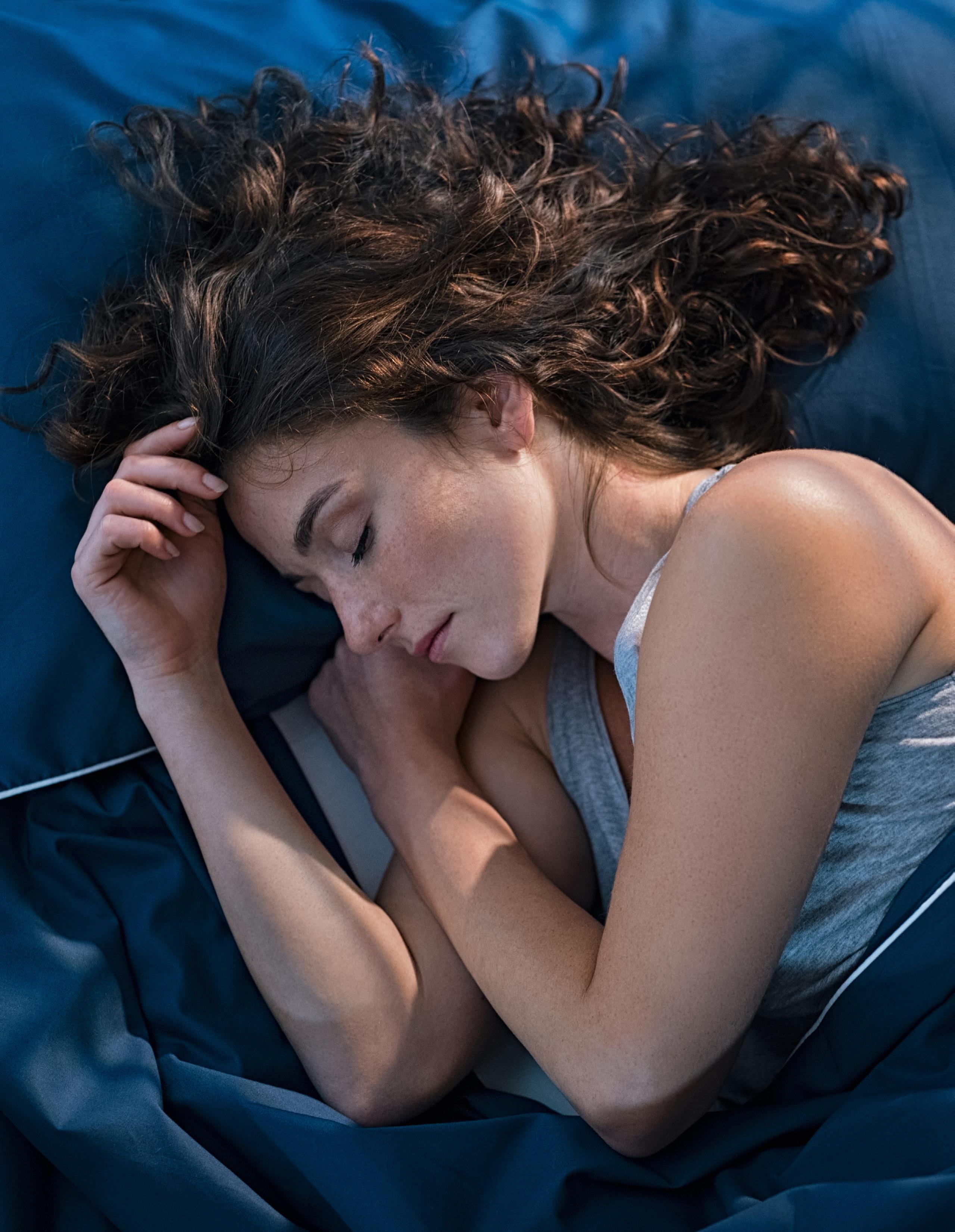
19 5 SCIENCE-BACKED SECRETS FOR BETTER SLEEP
Additional Considerations:
What about naps?
Most of us have enjoyed at least a nap or two in our lives, and we’ve likely heard about the benefits of “power naps” to get us quickly feeling better. But should we all be napping? Is there a downside to napping?
A wide range of research has linked napping to benefits to brain and body. This science especially speaks to the healing power of even short bursts of sleep in recharging our cognitive capacity. Another takeaway from this research is that naps may especially boost our brain and body function when we’ve been sleep deprived. However, there are a few things to keep in mind before settling into a pattern of daily naps.
1. Consistent napping can be an indicator of low-quality sleep. If you’re always feeling tired during the day, it may make more sense to focus on why that is the case, rather than consistently patching the hole with naps (see the below section when to speak with a healthcare provider about your sleep issues)
2. Longer naps (think >30-40 minutes) may significantly throw off your sleep patterns, and may be better to avoid. Try to keep naps to <30 minutes to get the best bang for your buck, without the nap hangover!
3. Napping could help make you less sleepy, and in doing so, make it harder to fall asleep later that day, perpetuating a cycle of poor nighttime sleep and a need for daytime naps. If you’re struggling to fall asleep at night and take regular daytime naps, it may be worth pausing the afternoon siestas.
20 5 SCIENCE-BACKED SECRETS FOR BETTER SLEEP
What about sleep supplements and medications?
Prescription sleep aids
Many people use prescription medications, supplements and other aids to help them fall and stay asleep. Popular sleep medications may seem like a great solution for poor sleep, but it’s notable that they’ve been associated with a wide variety of side effects and risks. Additionally, their effects tend not to replicate natural sleep. Generally speaking, sleep prescriptions are designed to be used for short time intervals (daysweeks) as opposed to months to years. With all this said, it doesn’t mean that certain people can’t benefit from a prescription sleep medication, simply that they are far from a perfect solution.
It’s notable that many people take sleep medications without a prescription. This is especially concerning because they are potentially dangerous drugs when used incorrectly. Additionally, relying on sleep drugs that were not obtained through a prescription could mean missing a diagnosis or more helpful treatment. The bottom line: use of prescription sleep drugs is far from a universal solution, and needs to be carefully considered in conjunction with a qualified health practitioner.
Over-the-counter sleep aids and supplements
When it comes to supplements and other over-the-counter options, there are a wide range of products on the market. Among the top sellers are products containing diphenhydramine and doxylamine (anti-allergy medications with sedative properties) as well as “natural” products like melatonin (a concentrated version of a naturally occurring hormone), valerian and chamomile (made from plants), L-theanine, magnesium and others. These products have varying degrees of scientific support and work through different pathways in our brains and bodies. Here are some important considerations before taking these products for sleep:
• Antihistamines may become less effective when used for sleep over longer periods. They also may increase risk of confusion and falls in older populations, and carry risk for a wide variety of potential side effects.
• Sleep supplements are a largely unregulated market, which means the quality and quantity of the active ingredient in your capsules, tea and powder is often anything but standardized (and what’s in them may not even be what you think you’re buying).
21 5 SCIENCE-BACKED SECRETS FOR BETTER SLEEP
• Many of the ingredients in non-prescription sleep products have minimal evidence for their benefit in quality of sleep.
• Supplements and other over-the-counter products can interact with prescription medications.
• It’s important to ask why you’re turning to a sleep aid. Are you addressing the underlying issues or just purchasing a band-aid? If you’re experiencing significant sleep issues, you’re likely better served working with a health provider than trying to fix the issue with pills and powders of any sort.
• If you do choose to use a non-prescription product for your sleep, look for a reputable brand that clearly states the ingredients in the product.
When to speak with a healthcare provider about your sleep
With everything you’ve learned about the value of quality sleep, you can likely see why prioritizing good sleep each night is so important to your health. It’s important to note that even with all of the tips and tricks described in the prior pages, you may still experience significant issues with sleep quality as well as feeling poorly rested and sleepy in the daytime. This speaks to a key point: a number of people may experience poor sleep due in part to underlying psychological and medical issues, and they may benefit from speaking to their health provider or a sleep specialist. One important example is obstructive sleep apnea, although there are a number of other significant sleep disorders (e.g., restless leg syndrome)
Obstructive sleep apnea (OSA) is an incredibly common condition (likely around 1 in 5 adults) that is dramatically rising in prevalence. In OSA, a person’s airway collapses, leading to a pause in breathing that severely compromises quality of sleep. Some risk factors that may put you at higher risk for OSA include having a larger neck, snoring, having high blood pressure and being overweight. Fortunately, there are effective therapies for OSA, and for many, it may be reasonable to ask your health practitioner about being evaluated for this condition.
More generally, if are experiencing significant issues with your sleep quality, or you are not getting any benefit to your sleep despite trying more conservative measures, it may be very prudent to talk to your healthcare practitioner about doing a sleep study or getting further assistance with your sleep. Beyond this, some people will additionally benefit from seeing a sleep specialist who can further investigate and create a treatment plan for contributors to poor sleep.
22 5 SCIENCE-BACKED SECRETS FOR BETTER SLEEP
Summary
5 Secrets for Better Sleep
1. Great sleep starts with your morning routine
• Get more natural light in the morning
• Get less artificial light at night (especially blue light!)
• Minimize caffeine exposure in the afternoon
• Be careful with evening/nighttime alcohol intake
2. Make your room a sleep sanctuary
• Remove unnecessary devices
• Remove unnecessary noises
• Optimize your bedroom temperature
3. Get your brain and body ready for sleep
• Listen to music
• Take a hot bath/shower before bed
• Practice mindfulness
• Practice gratitude
• Read a (paper) book
4. Move your body every day
• Shoot for 20 minutes of movement for 5 days a week
5. Practice consistency in sleep and waking times
• Set (and stick to) a consistent bedtime and waking time for at least 5 days of the week.
23 5 SCIENCE-BACKED SECRETS FOR BETTER SLEEP
Science + Studies
> National trends in short sleep duration among US adults, 2013–2020. Center for Disease Control, 2022 LINK
> The world’s largest-ever online ‘sleep census’ reveals a sleep-deprived planet, Loughborough University, 2016 LINK
> Which state has the most sleep deprived residents in the country?, USA TODAY, 2021 LINK
> What Are Sleep Deprivation and Deficiency?, National Heart, Lung and Blood Institute, 2022 LINK
> Sleep in America Poll 2020, National Sleep Foundation, 2020 LINK
> Sleep Influences What You Eat, Austinperlmutter.com, 2022 LINK
> Estimation of the global prevalence and burden of obstructive sleep apnoea: a literature-based analysis, Lancet Respiratory Medicine, 2019 LINK
> 4 Ways Sleep Can Rapidly Improve Brain Function, Austinperlmutter.com, 2022 LINK
> Effects of light on human circadian rhythms, sleep and mood, Somnologie, 2019 LINK
> Effects of pre-bedtime blue-light exposure on ratio of deep sleep in healthy young men, Sleep Medicine, 2021 LINK
> Impact of daily caffeine intake and timing on electroencephalogram-measured sleep in adolescents, Journal of Clinical Sleep Medicine, 2022 LINK
> Investigation of the Effects of Alcohol on Sleep Using Actigraphy, Alcohol and Alcoholism, 2012 LINK
> Alcohol and the risk of sleep apnoea: a systematic review and meta-analysis, Sleep Medicine, 2018 LINK
> The Effect of Room Acoustics on the Sleep Quality of Healthy Sleepers, Noise Health, 2016 LINK
> Environmental noise, sleep and health, Sleep Medicine Reviews, 2007 LINK
> The effects of white noise on sleep and duration in individuals living in a high noise environment in New York City, Sleep Medicine, 2021 LINK
24 5 SCIENCE-BACKED SECRETS FOR BETTER SLEEP
> Sleep and thermoregulation, Current Opinions Physiology, 2020 LINK
> Associations of bedroom temperature and ventilation with sleep quality, Science and Technology for the Built Environment, 2020 LINK
> The Cardiovascular Effect of Musical Genres, Deutsches Ärzteblatt International, 2016 LINK
> Effect of Music Therapy on Sleep Quality, Alternative Therapies in Health and Medicine, 2019 LINK
> Before-bedtime passive body heating by warm shower or bath to improve sleep: A systematic review and meta-analysis, Sleep Medicine Reviews, 2019 LINK
> Waking up to the problem of sleep: can mindfulness help? A review of theory and evidence for the effects of mindfulness for sleep, Current Opinion in Psychology, 2019 LINK
> A systematic review of gratitude interventions: Effects on physical health and health behaviors, Journal of Psychosomatic Research, 2020 LINK
> Does reading a book in bed make a difference to sleep in comparison to not reading a book in bed? The People’s Trial—an online, pragmatic, randomised trial, Trials, 2021 LINK
> Reading from an iPad or from a book in bed: the impact on human sleep. A randomized controlled crossover trial, Sleep Medicine, 2016 LINK
> Exercise can improve sleep quality: a systematic review and meta-analysis, PeerJ, 2018 LINK
> Does exercise improve sleep for adults with insomnia? A systematic review with quality appraisal, Clinical Psychology Review, 2019 LINK
> Effects of physical activity programs on sleep outcomes in older adults: a systematic review, International Journal of Behavioral Nutrition and Physical Activity, 2020 LINK
> The effect of physical activity on sleep quality: a systematic review, European Journal of Physiotherapy, 2021 LINK
> Bedtime routines child wellbeing & development, BMC Public Health, 2018 LINK
> Validation of the Sleep Regularity Index in Older Adults and Associations with Cardiometabolic Risk, Scientific Reports, 2018 LINK
> Systematic review and meta-analyses on the effects of afternoon napping on cognition, Sleep Reviews, 2022 LINK
> Benefits of Daytime Napping Opportunity on Physical and Cognitive Performances in Physically Active Participants: A Systematic Review, Sports Medicine, 2021 LINK
> Obstructive sleep apnea: current perspectives, Nature and Science of Sleep, 2018 LINK
25 5 SCIENCE-BACKED SECRETS FOR BETTER SLEEP
Austin Perlmutter, MD
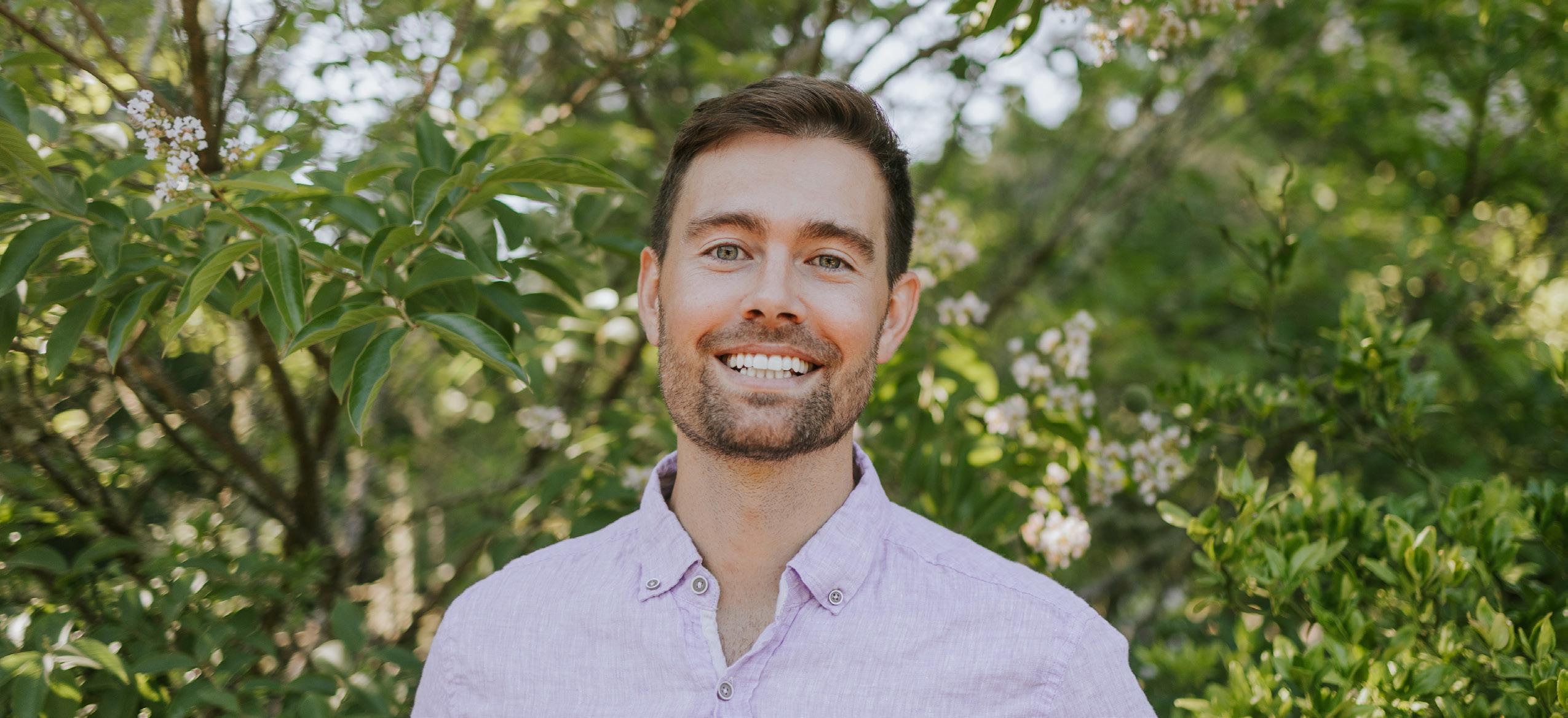
For all the latest science and tips on brain health, including additional tips on improving sleep: www.AustinPerlmutter.com



@draustinperlmutter
@draustinperlmutter © 2023 by Austin Perlmutter MD, LLC
Statements made in this document have not been evaluated by the FDA (U.S. Food & Drug Administration). They are not intended to diagnose, treat, cure, or prevent disease. The information provided by this website should not be used as individual medical advice. You should always consult your healthcare provider for individual recommendations and treatment.
26 5 SCIENCE-BACKED SECRETS FOR BETTER SLEEP

















